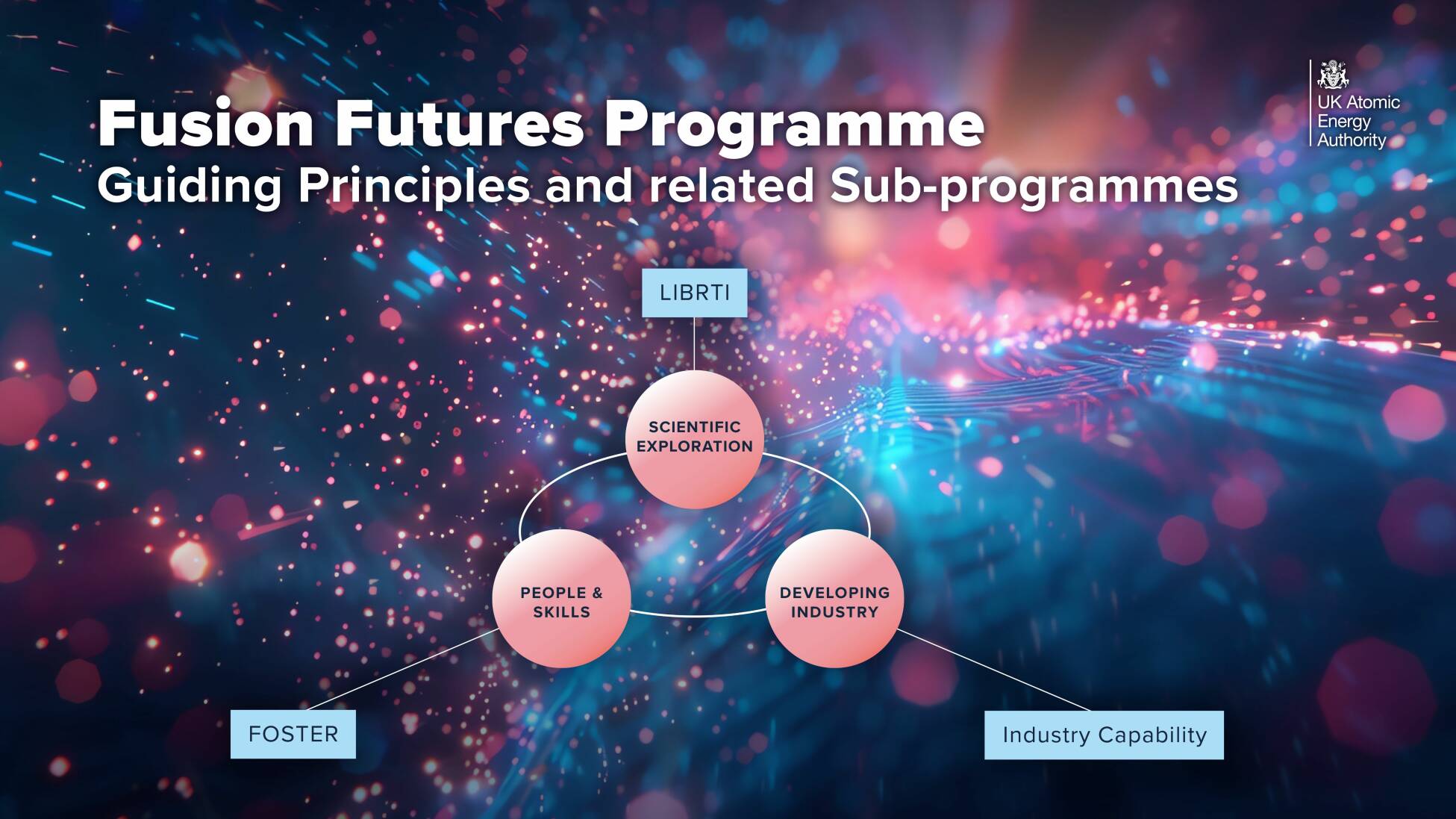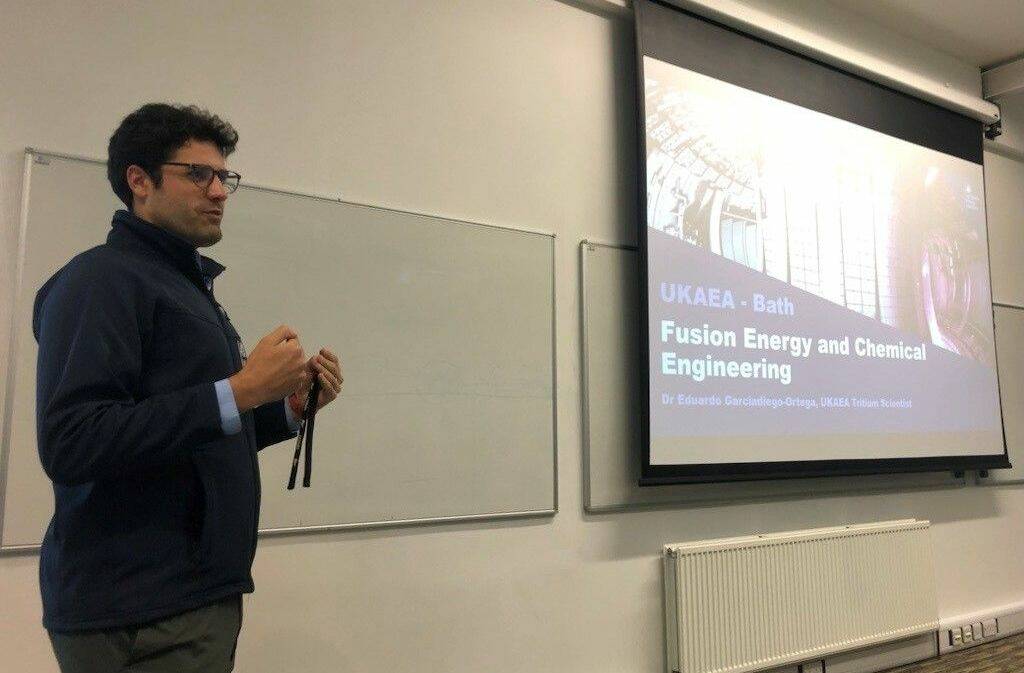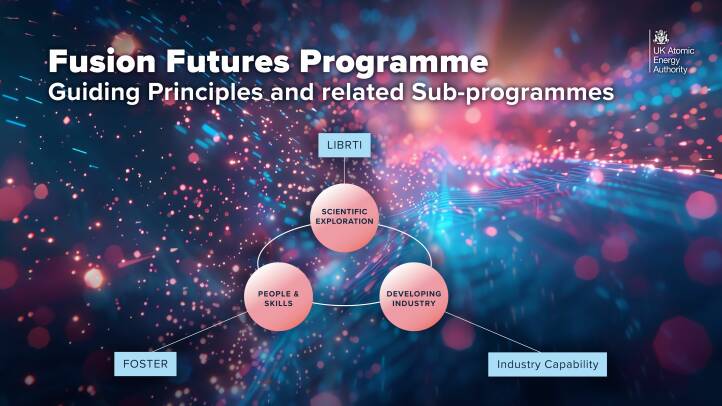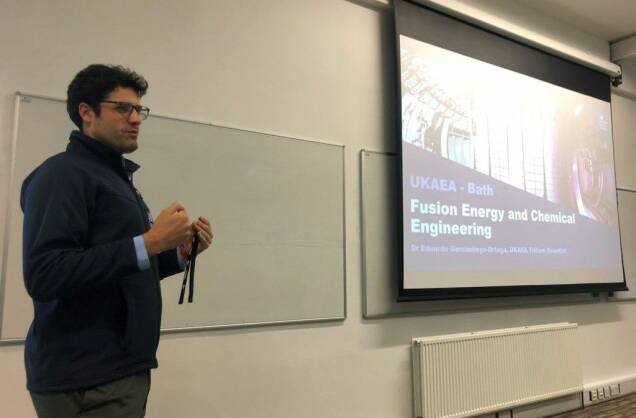Fusion Futures is here, but what exactly is it?
Fusion Futures is the UK fusion programme to replace the UK’s membership of Euratom R&T. In September 2023 the decision was taken to not re-associate to Euratom in the wake of the Brexit agreement. In October 2023 the government announced a £650 million package that would serve as an alternative to this association. Some of the background can be seen here.
Fusion Futures aims:
To maintain essential fusion research conducted in the UK and seek mutually beneficial international collaborations.
To enable the UK to maintain its global technical lead in fusion through the delivery of domestic capabilities.
To create a strong UK industrial sector that leads the world in operationalising and commercialising fusion energy.

Eduardo Garciadiego-Ortega, Senior Research Scientist, UKAEA, teaching students at the University of Bath.

The UKAEA's new Fusion Opportunities in Skills, Training, Education and Research (FOSTER) programme is seeking to partner with universities across the UK to enhance and embed fusion content into Master’s level teaching programmes. This could be through new fusion-specific modules or courses, enhanced delivery of existing courses to increase student numbers, or vocational routes such as higher-level apprenticeships. There should also be focus on supporting academic institutions in their growth, with the staff, the knowledge, and the skills to build on these provisions in the future – all while targeting at least 400 new students trained through these partnerships.
FOSTER aims to work bilaterally with universities who have made, or seek to make, fusion a significant part of their growth strategies, and are willing to match or exceed
the level of investment to create an impactful new or enhanced provision which is appealing to prospective students in the short, medium and long-term.
The intention of the FOSTER programme is to provide matched support in a flexible manner that meets the needs of universities which are proposing partnerships. Such proposals may include support for new academic/staff positions, projects to be undertaken by the university, studentships, or any other form of support that the university deems appropriate to achieve agreed goals.
Nick Walkden, Programme Director of FOSTER, said:
“UKAEA’s FOSTER programme will be supporting all levels of education and development in the next few years, and these new university partnerships are a key element of our strategy to better align higher level training for fusion in the UK with our perceived demand,”
“The nuances and complexities of putting fusion energy onto the grid will need bright and diverse minds, both at UKAEA and across the entire sector, in areas as diverse as plasma physics, artificial intelligence, tritium breeding and management, materials science, regulation, and programme management. The UK’s university landscape is world class, and we need our universities to embrace the challenge and work collaboratively with us to expand, enhance and embed fusion within their course provision, especially for post-graduates. This is why the partnerships project is a key element of the FOSTER programme.”
FOSTER’s mission is to train the estimated 2,200 people who will be needed across the fusion sector over the next five years, working with the private sector to increase the number of apprentices and graduates, universities to increase the number of postgraduates and PhDs, and international partners to increase post-doctoral training opportunities within fusion.
To find out more contact the FOSTER programme via fusionskills@ukaea.uk

Fusion Futures is here, but what exactly is it?
Fusion Futures is the UK fusion programme to replace the UK’s membership of Euratom R&T. In September 2023 the decision was taken to not re-associate to Euratom in the wake of the Brexit agreement. In October 2023 the government announced a £650 million package that would serve as an alternative to this association. Some of the background can be seen here.
Fusion Futures aims:
To maintain essential fusion research conducted in the UK and seek mutually beneficial international collaborations.
To enable the UK to maintain its global technical lead in fusion through the delivery of domestic capabilities.
To create a strong UK industrial sector that leads the world in operationalising and commercialising fusion energy.
Nick Walkden, Programme Director of FOSTER, said:
“UKAEA’s FOSTER programme will be supporting all levels of education and development in the next few years, and these new university partnerships are a key element of our strategy to better align higher level training for fusion in the UK with our perceived demand,”
“The nuances and complexities of putting fusion energy onto the grid will need bright and diverse minds, both at UKAEA and across the entire sector, in areas as diverse as plasma physics, artificial intelligence, tritium breeding and management, materials science, regulation, and programme management. The UK’s university landscape is world class, and we need our universities to embrace the challenge and work collaboratively with us to expand, enhance and embed fusion within their course provision, especially for post-graduates. This is why the partnerships project is a key element of the FOSTER programme.”
FOSTER’s mission is to train the estimated 2,200 people who will be needed across the fusion sector over the next five years, working with the private sector to increase the number of apprentices and graduates, universities to increase the number of postgraduates and PhDs, and international partners to increase post-doctoral training opportunities within fusion.
To find out more contact the FOSTER programme via fusionskills@ukaea.uk
The UK Atomic Energy Authority’s (UKAEA) new Fusion Opportunities in Skills, Training, Education and Research (FOSTER) programme is seeking to partner with universities across the UK to enhance and embed fusion content into Master’s level teaching programmes. This could be through new fusion-specific modules or courses, enhanced delivery of existing courses to increase student numbers, or vocational routes such as higher-level apprenticeships. This should also focus on supporting academic institutions in their growth, with the staff, the knowledge, and the skills to build on these provisions in the future – all while targeting at least 400 new students trained through these partnerships.
FOSTER aims to work bilaterally with universities who have made, or seek to make, fusion a significant part of their growth strategies, and are willing to match or exceed the level of investment to create an impactful new or enhanced provision which is appealing to prospective students in the short, medium and long-term.
The intention of the FOSTER programme is to provide matched support in a flexible manner that meets the needs of universities which are proposing partnerships. Such proposals may include support for new academic/staff positions, projects to be undertaken by the university, studentships, or any other form of support that the university deems appropriate to achieve agreed goals.
Eduardo Garciadiego-Ortega, Senior Research Scientist, UKAEA, teaching students at the University of Bath.
